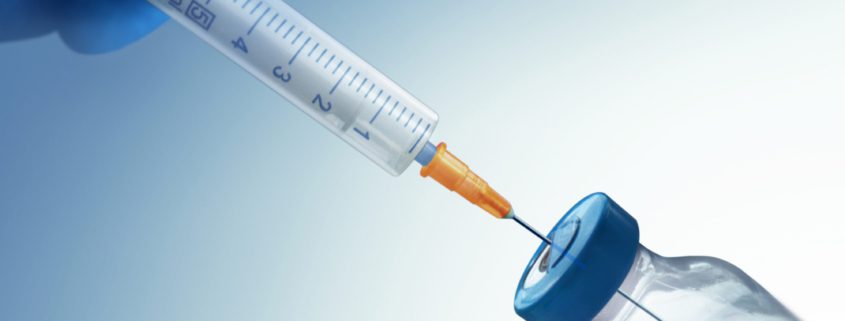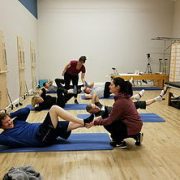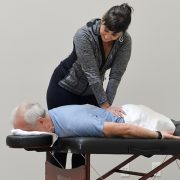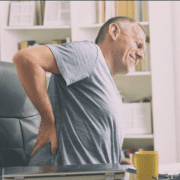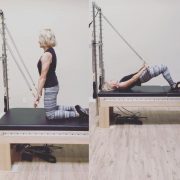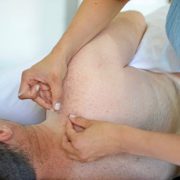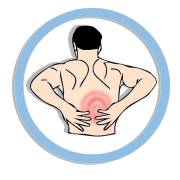Back Pain, Herniated Discs, and Cortisone Shots: What You Need to Know
A recent conversation about cortisone shots and back pain due to herniated discs inspired me to write this article.
The person I was speaking with was quite misinformed about when cortisone shots are useful – and when they aren’t. By the way, it’s a very common misunderstanding. But since I hate seeing people undergo unnecessary injections or procedures – I’m here to educate.
So let’s break it down: when is a cortisone shot a good idea, and when should you think twice?
When Cortisone Shots Work
Cortisone shots can be highly effective if your pain is primarily caused by inflammation, which is what I call “chemical pain.” Chemical pain results from your body’s inflammatory response to an injury. This response produces chemicals and nutrients that help heal the area, but sometimes the process gets “stuck”. The lingering chemicals cause persistent pain that doesn’t respond to movement or rest.
If your back pain is constant, feels hot and inflamed, and doesn’t improve with positional changes, you might have chemical pain. In these cases, a cortisone shot can eliminate the chemicals causing the pain and provide relief.
In other words – exercise – which is the best treatment for herniated discs and back pain – won’t work well when you have chemical pain. Historically that’s when cortisone shots are necessary. But in 2021 – an amazing technology called Electrocorporeal Magnetotransduction Therapy (EMTT) came to the United States and works just as well (if not better) than cortisone, except it’s natural and non-invasive. EMTT uses a high-frequency magnetic field that can penetrate up to 6 inches into the body – so it can heal inflammation in places like your lower back down to the cellular level. I’ve seen great results from it – so I’m starting to recommend this over a cortisone shot for anyone that needs it.
When Cortisone Shots Don’t Work
Most back pain (even those related to herniated discs) – aren’t chemical in nature. It’s mechanical, meaning it stems from issues with mobility and movement patterns. Mechanical pain – responsible for 70-80% of all musculoskeletal issues (including back pain) – will improve and resolve with precisely prescribed corrective-movement exercises. How do you know if you’re in this category? If your back generally feels better after walking, stretching, or changing positions – it’s almost certainly mechanical – because it’s responding to movement. If this sounds like you – a cortisone shot won’t address the root cause.
The key to resolving mechanical pain is identifying and correcting mobility restrictions and faulty movement patterns. Once you do this, the structural issue (like the herniated disc) becomes less relevant. Many people live symptom-free with herniated discs once they’ve addressed their underlying movement pattern problems and mobility.
The Gray Area
Here’s where it gets tricky: a herniated disc can irritate surrounding structures like muscles and nerves, causing localized inflammation. This type of pain can feel intense, but it’s not quite the same as chemical pain. But it will be tempting to get a cortisone shot for quick relief. The thing is – it will only be a temporary fix. The shot won’t address the underlying mechanical issues that caused the disc to “act up” in the first place. Worse, masking the pain can lead you to unknowingly worsen your problem, potentially leading to more procedures or surgery. In most cases, this type of inflammation can resolve naturally without drugs. Something like EMTT that I already mentioned, and other regenerative therapies like Shockwave Therapy work great for this type of inflammation.
Take Home Points:
Before you consider cortisone shots, take a moment to evaluate your pain:
- Does movement or activity influence your pain? If yes, it’s likely mechanical and won’t benefit from a cortisone shot.
- Is your pain constant, hot, and unresponsive to movement? If yes, you might benefit from a cortisone shot to calm the inflammation and enable movement to help.
- There are some amazing Regenerative Therapy Treatment technologies available now that serve as natural, non-invasive alternatives to cortisone shots if you are really inflamed. Plus – they work with your body’s own anti-inflammatory systems by giving them a boost.
Ultimately, cortisone shots don’t fix structural problems – they temporarily eliminate pain due to inflammation. While this can be useful in specific situations, it’s crucial to address the root cause of your pain to prevent long-term issues and seek healthier alternatives when you can.
Local to Portsmouth, NH? Schedule a free discovery visit with us today and take the first step toward lasting relief and better movement.
Dr. Carrie Jose, Physical Therapy Specialist, and Mechanical Pain Expert, owns CJ Physical Therapy & Pilates in Portsmouth, NH, and writes for Seacoast Media Group. If local to Portsmouth, NH, and looking for help – request a FREE Discovery Visit with one of her Specialists by CLICKING HERE.

